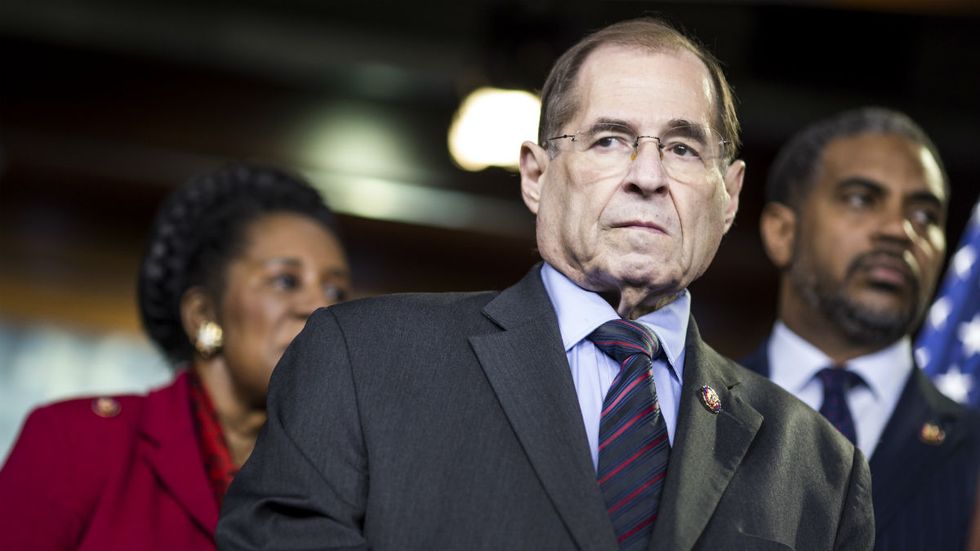
© 2024 Blaze Media LLC. All rights reserved.
Nadler's latest admission shows the House Democrats’ subpoena fight is all about the headlines
May 13, 2019
House Judiciary Committee Chairman Jerry Nadler, D-N.Y., has admitted something that really ought to make the American people reconsider what last few weeks' drama about the Mueller report was really supposed to be about.
Nadler now says that it was never really his intention to demand that the Department of Justice hand over secret grand jury information when his committee subpoenaed the full, unredacted Mueller report and its underlying evidence.
When asked why there was nothing in the subpoena to clarify that it didn't demand the federally protected information, Nadler told the Washington Times, “The subpoena doesn’t have to say it," and added that concern is "a red herring that the Republicans are raising.”
Was it really? Because from everyone else's vantage point so far, the grand jury information contained in the report has been the biggest, most glaring sticking point in discussions over the subpoena.
And while the committee agreed to an amendment clarifying that grand jury information wouldn't be subject to subpoena, there's no such provision in the subpoena itself. If that were really the case, it might have helped negotiations with the Department of Justice and debates with committee Republicans to have been up front about that sooner.
Just to catch everyone up, here's the time line so far:
- Attorney General Barr released a redacted version of a confidential report on the Mueller report, which he was under no statutory obligation to do.
- Nadler subpoenaed the full, unredacted Mueller report and its underlying evidence from the Department of Justice.
- The Department has objected to this, saying that the requested materials contain grand jury information that is protected by section 6(e) of the Federal Rules of Criminal Procedure.
- That section of the rules says that grand jury information cannot be made public without a court order, which has not been issued.
- Despite all this, the DOJ has allowed a dozen members of Congress to come and view a less-redacted version in a secure location at the Department.
- None of the six permitted Democrats have come forward so far to take advantage of that offer.
- The Department of Justice reiterated its invitation for Nadler to come view the less-redacted report and work out a compromise in compliance with federal rules.
- House/DOJ talks fell apart, and House Democrats scheduled contempt proceedings against Barr.
- In response to the contempt proceedings, the White House invoked executive privilege over the contested portions of the Mueller report.
- Now this fight enters the legal realm, and this latest admission could very well hurt Nadler's chances in court, given the differences between the committee's current position and the broad language of the subpoena.
When everything is viewed in context like that, and now that we know the grand jury info supposedly isn't in question, it's a wonder that there's anything left for the involved parties to haggle over.
But there is.
Because what's left after the grand jury info? According to the redactions in the public report, there's still information in there that could harm ongoing investigations or other matters, which speaks to why the DOJ would like to keep that information in a secure location. It's not difficult at all to imagine that, if just outright handed over to committee members and staff, that other sensitive sensitive information might find its way into the hands of a Trump-hostile press.
Given that possibility, it makes sense that DOJ would only open the information up to a select few members of Congress who had committee jurisdiction and not let them walk off with it.
In case anyone forgot, that's exactly how things were handled with the follow-up investigation during the confirmation hearings for Supreme Court Justice Brett Kavanaugh, except that the secure location was within the Capitol complex.
However, whether or not such a setup for the House Judiciary Committee was discussed in the Nadler-Barr negotiations seems to be irrelevant now, given the current state of escalation.
But of course, that's all part of the twofold advantage here for House Democrats: On the one hand, they have the option of convincing people who haven't done their homework that the administration is somehow covering something up in those redacted portions of the report. On the other, if they actually get what they're asking for, everyone should just be prepared to watch that information start leaking faster than a submarine with screen windows.
#mc_embed_signup{background:#fff; clear:left; font:14px}
/* Add your own MailChimp form style overrides in your site stylesheet or in this style block.
We recommend moving this block and the preceding CSS link to the HEAD of your HTML file. */
Want to leave a tip?
We answer to you. Help keep our content free of advertisers and big tech censorship by leaving a tip today.
Want to join the conversation?
Already a subscriber?
more stories
Sign up for the Blaze newsletter
By signing up, you agree to our Privacy Policy and Terms of Use, and agree to receive content that may sometimes include advertisements. You may opt out at any time.
© 2024 Blaze Media LLC. All rights reserved.
Get the stories that matter most delivered directly to your inbox.
By signing up, you agree to our Privacy Policy and Terms of Use, and agree to receive content that may sometimes include advertisements. You may opt out at any time.



